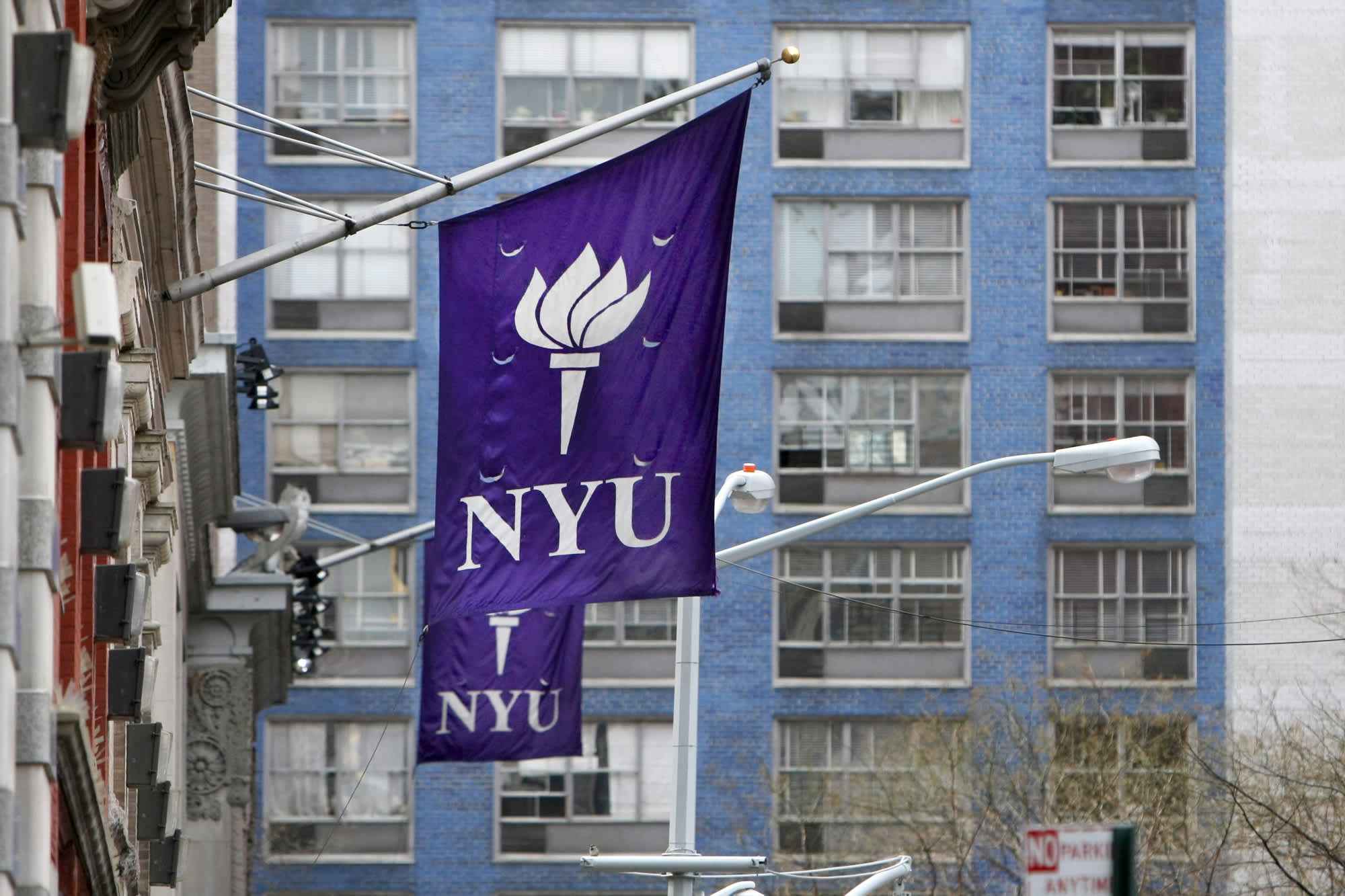GMAT Scores, Gender Parity Slip for Columbia Class of 2021

Data from the most recent Columbia Business School full-time MBA class has been officially revealed, with modest decreases in the program’s GMAT average, gender parity, and total enrollment. However, despite the changes, the Columbia 2021 MBA class remains largely the same as the previous class.
Continue reading…Northwestern MBA Class of 2021 Introduced at Kellogg

The Northwestern MBA Class of 2021 at the Kellogg School of Management reflects the intelligence and diversity that the school is known for.
Continue reading…GMAT Scores, GPA, Rise Again for NYU Stern Class of 2021

NYU Stern got a jump start on introducing its full-time MBA Class of 2021.
Of the 3,518 applicants hoping to join the NYU Stern Class of 2021, only 919 were admitted and 359 enrolled, for a 26 percent admission rate. Those students are, on average, 28 years old and have 5.2 years of professional experience. A few of them were also fresh graduates, with 3 percent having no work experience.
Dramatic Jumps in Academic Performance

One of the major highlights from the NYU MBA Class of 2021 is the improved academic performance of the candidates.
- The average GMAT score rose 5 points, from 716 to 721
- Average GPAs increased from 3.45 to 3.52
There was also quite a difference regarding undergraduate majors. While a quarter of the Class of 2020 majored in business, that percentage increased to 30 for the new group. Meanwhile, the choice of engineering, math, or science as a major matched last year’s candidates at 22 percent. The third most popular major for the Class of 2021 was social sciences (19 percent) followed by economics (15 percent). This is a reverse of last year when a fifth of the class were economics majors.
Women on the Rise, Veterans Hold Steady
The NYU MBA Class of 2021 is expected to arrive on campus with more women than last year—female enrollment rose from 35 percent to 36 percent. However, international diversity decreased slightly. Only 33 percent of the Class of 2021 maintains international citizenship in 37 different countries, compared to 39 percent last year.
There was also a slight decrease in the number of minorities represented in the student body. In the Class of 2021, around a quarter of students (24 percent) identify as minorities, 9 percent of whom are underrepresented minorities. That’s down from 29 percent and 13 percent from last year. However, 7 percent of students are still U.S. Military veterans or on active duty, which is owed in part to the Fertitta Veterans Program.
Work Experience and Industry Background
Students entering the NYU MBA Class of 2021 come from a wide range of industries and backgrounds, the most popular being financial services (28 percent). After that, prior industries are widely mixed with no other industry breaching 12 percent of the class. They include:
- Consulting, 11 percent
- Technology, 9 percent
- Consumer, Products, Retail, 7 percent
- Nonprofit, Arts, Education, 7 percent
To see the full profile as of July 31, 2019, visit the Stern full-time MBA admissions website.
This article has been edited and republished with permissions from its original source, Clear Admit.
5 Questions With UC Davis MBA Admissions Senior Director Andrea Shaw

In our latest installment of the MetroMBA “5 Questions” series, we speak with Andrea Shaw, Senior Director of Admissions at the UC Davis Graduate School of Management. Shaw discusses the tight-knit culture of the UC Davis MBA program, what students can expect, and what qualities define the program.
How does UC Davis help MBA applicants who don’t come from a traditional business or quantitative background?
“Students come to us from across industries, functions, and from around the world. We pride ourselves on being a tight-knit and collaborative community where conversations directly happen between faculty, staff, and students. Our curriculum also allows students to choose between many different career paths especially given the connections we have across other UC Davis schools.
For students coming from a non-business background or who are nervous about starting, we’re a school that really fits. Many schools have 600 students in a full-time program. We only have 50 students. That allows us to personalize the journey of each student.
Also, UC Davis doesn’t believe in just throwing our students into the program. We get to know our students and their needs—what they’re looking for, their strengths, weaknesses, etc. Part of that knowledge comes from our highly robust orientation where we spend almost a month before school starts to really engage with our students.

Andrea Shaw, Senior Director of UC Davis Graduate School of Management Admissions
During orientation, we spend a tremendous amount of time learning about our MBA class. There’s a significant career focus with discussion topics focused on networking, resume building, LinkedIn, etc. However, what the orientation is most known for is helping our students understand their emotional intelligence and develop their story through exercises and experiential learning.
Students have said in surveys that it’s the orientation that solidifies that they’ve made the right decision to come here. Those first few weeks are critical for setting them up for success.”
What type of culture defines UC Davis?
“The two words that continually come up from students, alumni, and faculty are “kind and compassionate.” We are driven toward success, but nice. It’s the idea of compassionate leadership, which research has shown to be necessary for true business growth. We even have an entire series that students can take to develop these skills, including awareness of themselves and others. Kindness and compassion are woven into every aspect of our culture, starting at the top with our dean.
Our culture is also defined by our location in a college town instead of a city. I love Davis as a city, community, and a place to go to college. It’s safe, comfortable, and all the energy revolves around the college.
We’re also really focused on what we do best as a university—biotechnology, sustainability, agriculture. Those sorts of segments and industries are very tied to our culture, university, and research. So, someone interested in Wall Street finance might not fit as well as someone interested in biotech.
Finally, because we’re a small community, you can really stand out. There are not a lot of politics to hold you back. You can get very involved, and there are fewer people vying for the same positions, so you can do as much as you want. This is highly beneficial for students who have a particular passion that they want to explore. For example, I know an MBA student who started a Women in Leadership organization because that was something she was passionate about, and it happened in a few conversations.”
Can you describe the qualities that UC Davis students possess?
“Other than the typical GMAT scores, GPA, and years of work experience, we look for applicants who know what they want to do with their MBA. Candidates should have a focus for the post-MBA career while also remaining open-minded about new opportunities. After all, an MBA is meant to be a transformative experience.
We also look for highly competent individuals who are professional in their verbal and written communications with us. We pride ourselves on being able to find jobs for all our students, so there’s a benchmark we look for—well-rounded students that have many different qualities. Going back to this idea of collaborative and kind, we look for candidates who are good team players and who see the value of working in groups because we have a lot of group work.
Finally, we look holistically at the class and how everyone will learn from each other. We look for a diverse class with students from a wide variety of backgrounds and industries. Everyone should be unique while still representing the essential qualities we love: kindness, compassion, and collaboration.”
If you could give one piece of advice to an MBA applicant interested in UC Davis, what would it be?
“Confidence! So much of what MBAs lack is confidence. The problem is that if you don’t think you can succeed, you won’t.
When you fill out your application and come in for your interview, we want confidence. Confidence is doing your research (knowing UC Davis), knowing who you are, and knowing your story. It’s also about being authentic. All of that leads to being confident in who you are and what you want. That will come across with us; it will come across anywhere.

“Confidence! So much of what MBAs lack is confidence. The problem is that if you don’t think you can succeed, you won’t,” Shaw says.
Remember, first impressions matter. That’s where that confidence helps too. If you come into a situation confidently, those first impressions are strong.”
What is your favorite San Francisco-focused business blog/website?
“I would say for applicants who are looking at schools in the Davis area, Metro-Edge.org is an excellent website. This is a website for young professionals in the Sacramento area. You’ll find events, gatherings, news, and more. It’s really focused on change and responsibility, and that’s great.
I also have to give a little plug to all of our social media accounts. Follow us on LinkedIn, Twitter, and Facebook for the latest news and insights. We also have MBA Showcase days coming up on January 26, February 9, and Feb 23.”
Northwestern Kellogg MBA Class of 2020: 46 Percent Women, 27 Percent U.S. Minorities

Northwestern University’s Kellogg School of Management announced today that women will make up 46 percent of the incoming two-year, full-time MBA Class of 2020. That’s a four-percentage point jump over last year and a record high for the school. U.S. minorities are also up—comprising 27 percent of this year’s first-year students, as compared to 25 percent last year. Meanwhile, average GMAT (732) and GPA (3.6) were identical to last year. Class size also remained constant at 478.
“I am very, very thrilled with the diversity of the class,” Melissa Rapp, Kellogg Director of Admissions for full-time MBA and MSMS programs, told Clear Admit. “And not just because of the percentages but also the quality of candidates across the board,” she said. International students will make up 34 percent of the incoming class, drawn from 46 countries around the globe, a modest one-percentage point decline amid soft overall international applicant volume to U.S. schools.
Rapp pledged that she and her team will keep striving to attract the most diverse classes possible. “I firmly believe that diversity in the classroom leads to better learning and a more impactful experience for every student who is here,” she said.

Steady State Elsewhere Is Great
For the past six years Kellogg’s average GMAT score has been on the rise, climbing from 708 in 2012 to 732 last year. Rapp said she is not at all concerned to have it remain static at 732 this year. “That our average GMAT and GPA have stayed the same shows that we continue to attract a really outstanding pool of applicants year after year,” she said.
Average undergraduate GPA also didn’t budge—coming in at 3.6 for now the third year running. As for what applicants studied while in college, 50 percent of this year’s incoming class majored in business or economics, up from 49 percent last year and 45 percent the year before that. STEM majors fell slightly to 29 percent, down from 30 percent the year before. Humanities majors both this year and last made up the remaining 26 percent.
Varied Professional Experience
In terms of pre-MBA work experience, approximately one in four incoming Kellogg students—24 percent—come from consulting, down from 27 percent last year. Another 19 percent come from the financial services industry, also a slight decrease from last year’s 20 percent.
Up this year? Students who have worked in tech/communications grew from 12 to 13 percent. “I think the changes that we see in our class really reflect the changes that we see in the business world,” Rapp said. “There are more people from tech, which is not surprising for anyone since there is more tech in the world than there ever has been.” Students with government/education/nonprofit experience also increased, from 7 to 9 percent.
Overall Rapp is pleased to see Kellogg continuing to attract a wide range of students from across functions and industries. “The variety continues to be very strong both in terms of our incoming students and our outgoing graduates,” she added. “Again, those differences and that diversity is what makes the Kellogg experience so strong.”
Kellogg’s Efforts to Support Women May Off
By far the biggest news today is that Kellogg has come closer than ever before to gender parity with its newest incoming class. USC Marshall School of Business made headlines last month by becoming the first leading business school to cross the 50/50 mark—women will make up 52 percent of the Marshall Class of 2020, a staggering 20-percentage-point jump over last year. At UT Austin’s McCombs School, which has also shared a preliminary Class of 2020 profile, the percentage of women slipped year over year, from 40 to 38 percent. And at Cornell’s Johnson Graduate School of Management, which welcomed it new Class of 2020 students to campus last week, women make up 33 percent, a five-point gain over last year.
“It’s really pretty exciting,” said Rapp of Kellogg’s 46 percent women. She credits the gains in female enrollment in part to the vision and leadership of outgoing Kellogg Dean Sally Blount, who served as dean from 2010 until she stepped this past spring.
Kellogg has also called on its current female students, including members of the Kellogg’s student-led Women’s Business Association (WBA), to take part in admissions outreach activities in hopes that they can forge meaningful connections with prospective female candidates early in their exploration process.

Melissa Rapp, Kellogg Director of Admissions for the full-time MBA and MSMS programs.
New this year, the school also convened its inaugural Global Women’s Summit in May. More than 1,200 women participated “live”—with 800 at Kellogg’s Global Hub in Evanston and the rest via extension events in London, Hong Kong, New York, Boston, San Francisco, Miami, Seattle, and Chicago hosted by companies including Amazon, Microsoft, and Starbucks. Over the course of the two-day event, the #KelloggWomen hashtag was trending in Chicago and generated 2.7 million overall impressions. “The breadth of engagement the summit allowed for provided a really nice bridge from prospectives to current students to our alumnae population,” Rapp said.
Kellogg also this year hosted its third-annual Women’s Leadership Seminar, a unique five-week lineup for second-year MBA students combining lectures, workshops, networking events, and alumni panels on recruiting issues women face. “The goal is to ensure that our high-potential women are equipped to pursue and navigate careers that have deep personal and professional meaning,” Rapp said.
“This combination of everything from lunch and learns to seminars to summits really helps the women here know that Kellogg understands the unique situation they are in and the challenges they will face on their journey to become impactful leaders and is proactively talking about that and helping them navigate that.”
Those Kellogg women, it seems, have been doing a good job of helping prospective female applicants see Kellogg as a place they want to be, too.
This article has been edited and republished with permissions from our sister site, Clear Admit.
GMAT Scores, International Students Jump at NYU Stern

Last week, the NYU Stern School of Business shared a preliminary profile of its Class of 2020. Even amid some declines, the school showed gains in the diversity of its class and added a few points to the average GMAT score for incoming students.
This year saw 3,781 applicants—down from 3,927 for the Class of 2019. Among the new applicants, 876 were admitted (23 percent) and a total of 375 enrolled. Last year, 822 applicants were admitted (21 percent), yielding 402 enrolled students.
Although the percentage of female students dropped slightly from the previous year (38 to 35 percent), the Class of 2020 is more global than the Class of 2019. International students increased from 37 percent last year to 39 percent, even as overall international MBA application volume to U.S. schools faltered.
“International applications were down about 10 percent this year, but they still represent about half of total applications, so we had a very strong pool of applications from which to admit,” an NYU spokesperson says.
The percentage of minority students held steady at 29 percent—the same as the previous year. But of those, 13 percent this year are underrepresented minorities (U.S. citizens and permanent residents who identify as African American/Black, Hispanic, or Native American/Alaskan Native), up 2 percentage points over the Class of 2019.
The average GMAT score for incoming students this year increased to 717—a three-point gain over the previous class. However, the median GMAT maintained the same score as the previous class, sitting at 720. At the same time, applicants opting to submit GRE scores instead of GMAT scores jumped from 12 to 19 percent, while the average GPA slipped slightly from 3.48 to 3.45.

The NYU Stern Class of 2020 sported a 717 GMAT average; three points higher than the previous class.
The Class of 2020 has a diverse educational background. Approximately 29 percent of students studied business as undergrads, more than any other major. Another 20 percent of the incoming class have degrees in engineering, math, and science. Economics, humanities, and social sciences majors make up the rest of the class, totaling 18 percent, 17 percent, and 16 percent, respectively.
Stern also continued its efforts to recruit military veterans and active duty service members, including through the Fertitta Veterans Program. Now in its second year, the program underwrites more than half of the tuition bill for approximately 20 incoming students annually. Veterans and active duty service members comprise 7 percent of the Class of 2020, similar to last year.
The average work experience among incoming students increased from 4.9 years for the Class of 2019 to to 5.3 years this year. More than a quarter—26 percent—of the Class of 2020 comes in with previous experience working in financial services, and another 13 percent come from consulting. The three next largest feeder industries are technology, entertainment/media, and military/government, making up 9 percent, 7 percent, and 7 percent, respectively. With regard to post-MBA career aspirations, members of the Class of 2020 are increasingly interested in consulting, technology, entrepreneurship, and healthcare.
Click here or more information on the NYU Stern Class of 2020.
